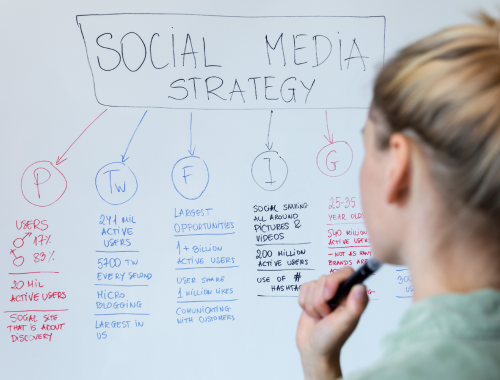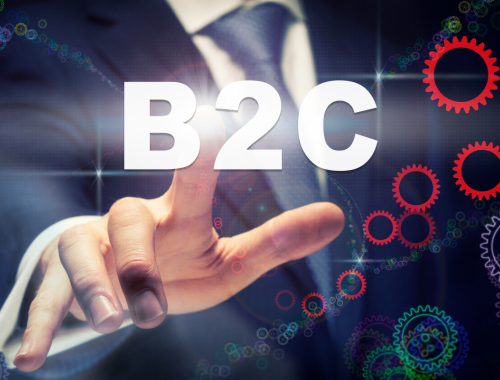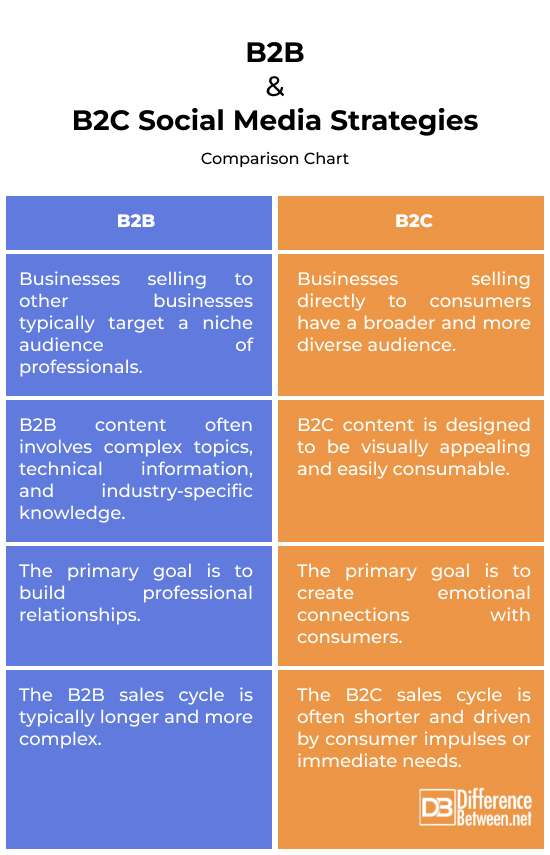Difference Between B2B and B2C Social Media Strategies
In the ever-evolving world of marketing, social media has emerged as a game-changer, offering businesses unparalleled ways to connect with their desired audiences. Social media has changed the way businesses promote themselves. Whether it’s B2B (business-to-business) or B2C (business-to-consumer), both can harness the power of social media, yet the strategies employed can be poles apart.
Let’s talk about social media marketing in regards to B2B and B2C companies. In this article, we’ll discuss the differences between B2B and B2C social media strategies and how these differences influence the overall approach and results.

B2B Social Media Strategies
B2B (business-to-business) is a business model that involves companies selling products or services to other businesses. It’s a commerce transaction between two businesses rather than between businesses and customers. B2B social media strategies often focus on building professional relationships, showcasing expertise, and providing valuable content.
For instance, a software company like Microsoft uses LinkedIn to share industry insights and connect with businesses, while IBM posts informative articles on Twitter to engage with B2B audiences, demonstrating their expertise in tech solutions. These strategies aim to create trust and credibility within the professional community.

B2C Social Media Strategies
B2C (business-to-customer) is a retail model of selling products or services directly to customers rather than businesses. B2C social media strategies revolve around creating brand awareness, showcasing products, and engaging with a broader audience. Popular B2C companies include Netflix, Amazon, Uber, Meta, and more. The strategies here aim to create an emotional connection with customers, generate brand loyalty, and encourage immediate purchases.
B2C marketing often uses visually appealing and consumer-centric content to attract a wide audience and drive sales. This can include strategies like influencer marketing, social media advertising, and promotions tailored to consumer interests and preferences. The ultimate goal is to make products or services attractive, accessible, and desirable to individual customers.
Difference between B2B and B2C Social Media Strategies
Target Audience
Businesses selling to other businesses typically target a niche audience of professionals, decision-makers, and specific industries. Their content needs to address the unique challenges and needs of these businesses. B2C, on the other hand, refers to a transaction model wherein businesses sell directly to consumers and have a broader and more diverse audience. Their content must resonate with individual preferences, interests, and lifestyles.
Content
B2B content often involves complex topics, technical information, and industry-specific knowledge. It aims to educate and inform, showcasing the company’s expertise. Examples include in-depth whitepapers, case studies, and webinars. B2C content is designed to be visually appealing and easily consumable. It relies on images, videos, and simple, engaging messages. Content may focus on storytelling, product showcases, and user-generated content like reviews and testimonials.
Primary Goal
Building professional relationships is a primary goal in B2B marketing. The focus is on trust and credibility. Businesses engage in discussions, provide solutions, and demonstrate their industry knowledge over time to establish long-term connections. B2C strategies aim to create emotional connections with consumers. The emphasis is on resonating with individuals’ emotions, desires, and immediate needs. Engagement is often more personal and interactive.
Sales Cycle
The B2B sales cycle is typically longer and more complex. It involves multiple decision-makers, thorough evaluations, and negotiations. Social media content plays a role in nurturing leads and building trust throughout this extended process. B2C sales cycles are often shorter and driven by consumer impulses or immediate needs. Social media content may be designed to capture attention, prompt quick decisions, and facilitate direct purchases.
B2B vs. B2C Social Media Strategies: Comparison Chart

Summary
In a nutshell, B2B targets businesses with specialized, educational content, focusing on long-term relationship building during complex sales cycles. In contrast, B2C targets a diverse consumer audience, using visually appealing, emotionally driven content for shorter, impulse-driven sales. These differences reflect distinct audience needs and expectations, shaping content and engagement strategies in each domain.
FAQs
What is the difference between B2C and B2B social media marketing strategies?
B2C social media marketing targets consumers with visually engaging, emotionally-driven content for shorter sales cycles. B2B strategies focus on businesses, using educational and expert-driven content for long-term relationship building during complex sales processes.
What is the difference between B2B and B2C sales and what are the social media platforms we can target for B2B lead generation?
B2B sales involve selling products or services to other businesses, often with longer, more intricate sales cycles. Social media platforms for B2B lead generation include LinkedIn, Twitter, and professional forums. B2C sales target individual consumers, often with shorter, impulse-driven sales, using platforms like Facebook, Instagram, and TikTok.
What is the difference between B2B and B2C media?
B2B media caters to business audiences with content focusing on industry expertise, while B2C media serves consumers with content that resonates emotionally and aesthetically.
What is B2C B2B on social media?
B2C and B2B on social media refer to distinct marketing approaches. B2C aims to connect with individual consumers through engaging, consumer-centric content, while B2B targets businesses with professional, expertise-driven content.
What are B2C marketing strategies on social media?
B2C marketing strategies on social media utilize visually appealing, emotionally resonant content to attract and engage consumers. Strategies may include user-generated content, influencer collaborations, and promotions.
What is the difference between B2B and B2C influencer marketing?
B2B influencer marketing often involves industry experts and thought leaders who can provide valuable insights and credibility. B2C influencer marketing may include popular figures who resonate with consumer interests and lifestyles, focusing on relatability and lifestyle promotion.
- Difference Between Caucus and Primary - June 18, 2024
- Difference Between PPO and POS - May 30, 2024
- Difference Between RFID and NFC - May 28, 2024
Search DifferenceBetween.net :
Leave a Response
References :
[0]Bodnar, Kipp and Jeffrey L. Cohen. The B2B Social Media Book: Become a Marketing Superstar by Generating Leads With Blogging, LinkedIn, Twitter, Facebook, Email, and More. John Wiley and Sons, 2011.
[1]King, Kim Ann. The Complete Guide to B2B Marketing: New Tactics, Tools, and Techniques to Compete in the Digital Economy. Pearson Education, 2015.
[2]“How to Use Social Media for B2C Marketing.” Workspace Digital, https://workspace.digital/how-to-use-social-media-for-b2c-marketing/. Accessed 1 Nov. 2023.
[3]Image credit: https://www.canva.com/photos/MAEC-AeJDi0-woman-working-on-social-media-and-influencer-marketing-strategy-plan/
[4]Image credit: https://www.canva.com/photos/MADIdESl1r8-a-businessman-pressing-a-b2c-business-concept/
